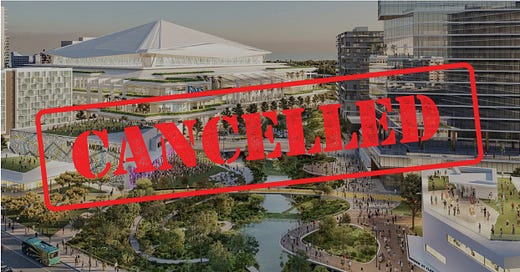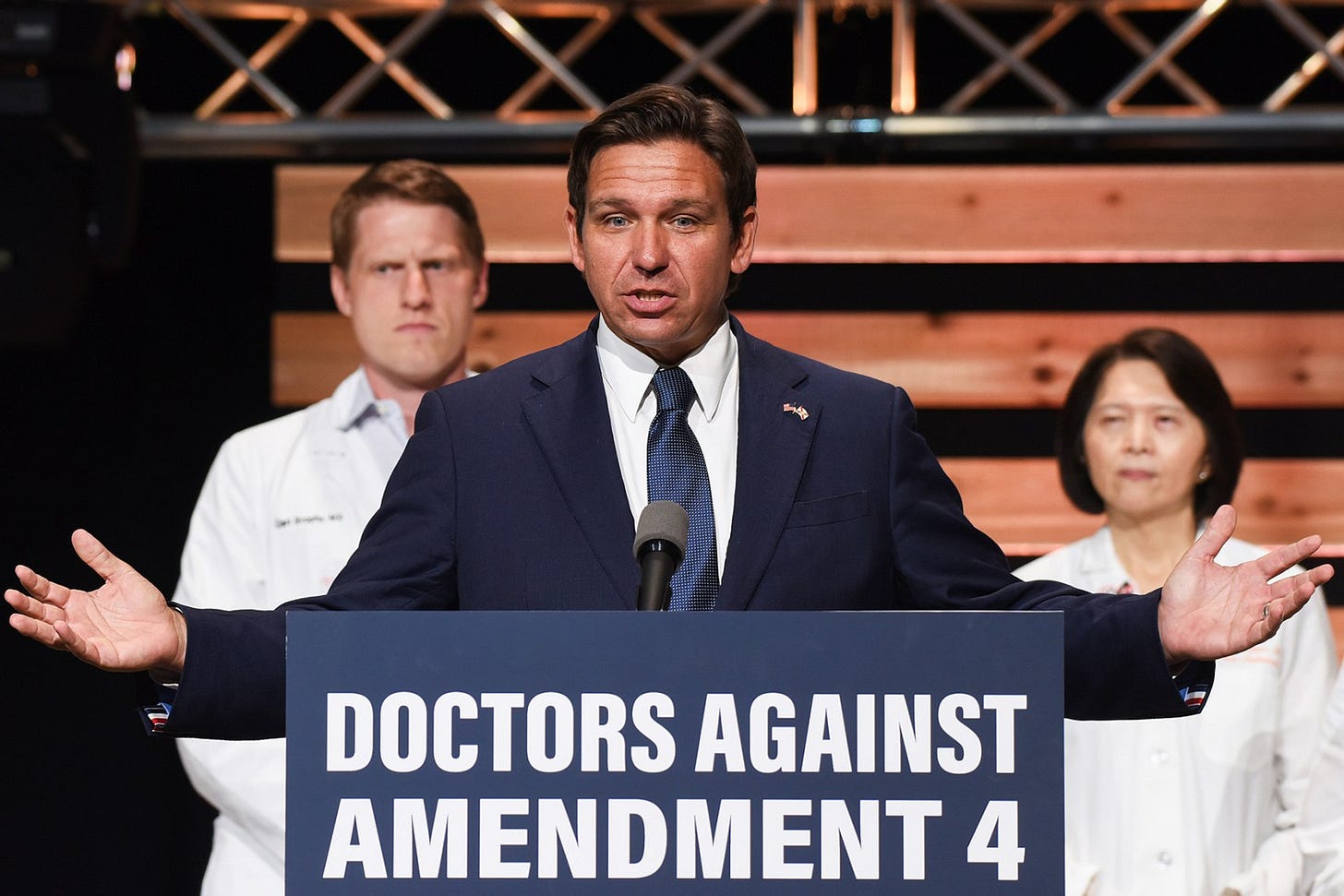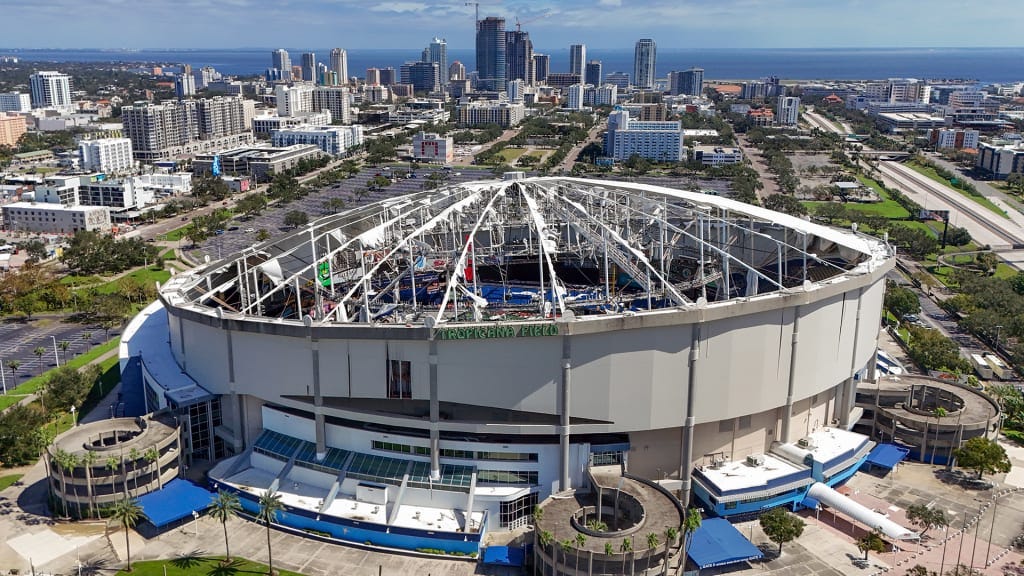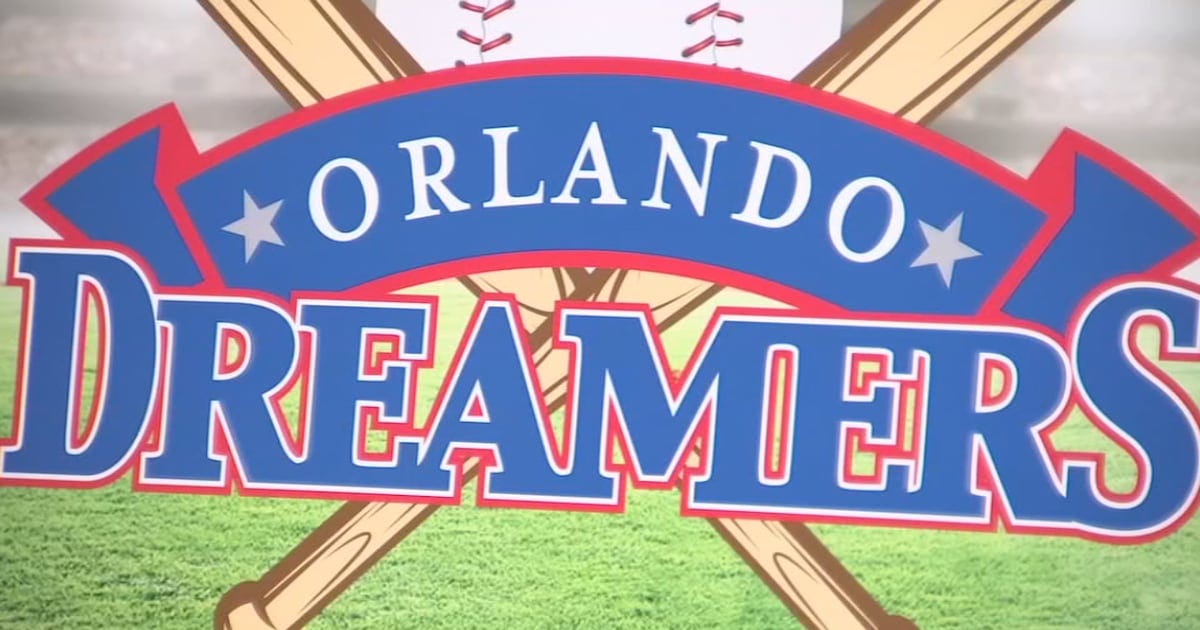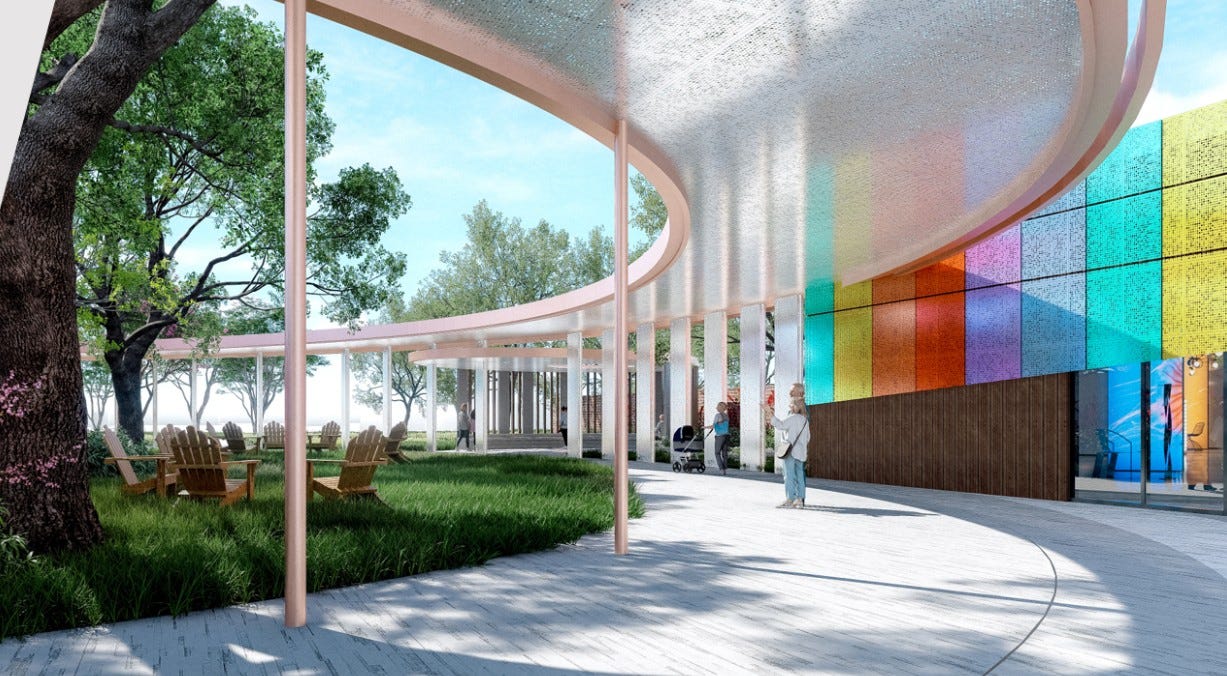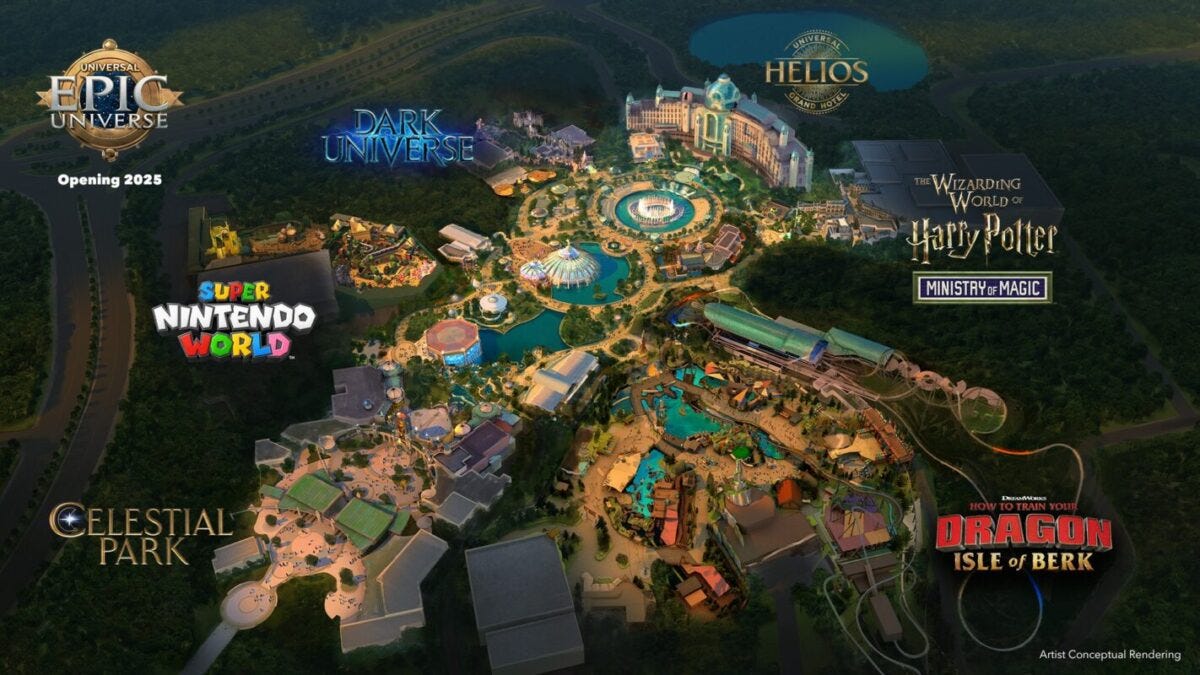Tampa Bay Rays Withdraw from $1.3B Stadium Project & Lawmakers Move to Ban State Funds for Ballot Amendment Campaigns
March 17, 2025 - This Week's News from Central Florida
Welcome to this week’s edition of the Central Florida Times, an independent, reader-supported newsletter focusing on the Sunshine State. These are the most important stories you need to know from across Central Florida. To never miss an update, subscribe here:
Here’s the latest from Central Florida…
THE DEAL IS DEAD: Rays Withdraw from $1.3B Stadium Project
The Tampa Bay Rays announced last Thursday that they will not proceed with the proposed $1.3 billion stadium and 65-acre redevelopment project in St. Petersburg. Team owner Stuart Sternberg cited unforeseen events since October, which included a hurricane-damaged Tropicana Field, as the reason for this "difficult decision." The decision came just weeks before a deadline requiring the team to prove its commitment to the project. “After careful deliberation, we have concluded we cannot move forward with the new ballpark and development project at this moment,” Sternberg stated. The project aimed to keep the Rays in St. Petersburg while addressing historical injustices in the city's Black community through revitalization, job creation, and housing opportunities in a $6.7-billion economic development plan. Following the news, Major League Baseball released a statement reaffirming Commissioner Rob Manfred’s commitment to securing “the club’s future in the Tampa Bay region.” St. Petersburg Mayor Ken Welch called the announcement "a major disappointment," although he was unsurprised given the challenges and discord between the Rays and local officials. Mayor Welch added he has "no interest in working with this ownership group" as the city aims to move forward with prioritizing the redevelopment of the Historic Gas Plant District. The team’s abandonment of the stadium deal–agreed to in July 2024–went awry after Hurricane Milton caused $55 million in damages to Tropicana Field and effectively left the Rays homeless. Postponements related to the county commission’s seven-week delay of a vital stadium bond vote, the ensuing lost revenue of playing in a reduced capacity minor league stadium, and inflated construction costs have led to a significant increase in costs. Team owner Sternberg has deemed these added expenses unjustifiable. The Rays were closing in on a March 31 deadline to prove their $700 million in secured financing and ability to move forward with the project. With Major League Baseball’s future in St. Petersburg shrouded in uncertainty, Tampa is eyed as the team’s next destination to restart the nearly two-decade crusade for a new stadium. Mayor Jane Castor expressed that her city, Hillsborough County, and the Tampa Sports Authority are open to future talks with the organization, emphasizing any proposal must benefit local taxpayers and the community. The Rays' current agreement with St. Petersburg expires in 2028 or 2029, depending on when stadium repairs are completed. “Our commitment to the vitality and success of the Rays organization is unwavering,” Sternberg said in Thursday’s statement. “We continue to focus on finding a ballpark solution that serves the best interest of our region, Major League Baseball and our organization.” Meanwhile, Developer Thompson Whitney Blake has stepped forward with a $260 million cash offer to buy the Tropicana Field property in downtown St. Petersburg for a convention center project.
Florida Lawmakers Move to Ban State Funds for Ballot Amendment Campaigns
In response to Governor Ron DeSantis' use of state resources to oppose abortion and marijuana initiatives during the 2024 election cycle, a Republican-led proposal to prohibit the use of public funds for ballot amendment campaigns has gained traction. The Senate Ethics and Elections Committee approved an amendment by Sen. Jennifer Bradley (R-Fleming Island) last week, adding it to a larger bill reforming the ballot initiative process. Senator Jennifer Bradley, the measure's sponsor, stated, "This amendment makes sure taxpayers don't get the bill for political issue campaigns." She emphasized that while public messaging campaigns would still be allowed, using state funds to influence ballot measure outcomes makes her "very uncomfortable." The move comes after the DeSantis administration spent millions on ads against abortion rights and marijuana legalization initiatives in 2024. Both measures fell short of the 60% threshold required for passage. The measure would ban state-funded "public service messages" about ballot measures, regardless of their factual nature. Sen. Bradley, a Republican, suggested the Legislature should conduct a review of the DeSantis administration's spending to defeat the two constitutional amendments last year. The proposal has sparked debate, with some Republicans expressing concerns about its broad interpretation. Sen. Erin Grall (R-Fort Pierce) worried it might inadvertently affect public health campaigns. While Democratic lawmakers expressed support for the amendment preventing taxpayer-funded political influence, they opposed the overall bill, arguing that it creates new obstacles for citizen-led initiatives, including tighter deadlines and stiff penalties for violations. If it becomes law, the legislation would impose stricter requirements and higher costs on signature-gathering campaigns. The House is considering a similar measure to the Senate bill. The House speaker, Senate president, and Gov. DeSantis have all voiced support to making changes to Florida’s voter-driven ballot initiative process, claiming reforms are necessary to reduce fraud.
State Lawmakers Tackle Flaws in Live Local Act
Florida’s Live Local Act, passed in 2023 to address the state’s housing affordability crisis, is under scrutiny as cities and developers grapple with its unintended consequences. The law, aimed at incentivizing workforce housing through tax breaks and zoning flexibility, has faced backlash after amendments last year allowed municipalities to opt out of key provisions. Developers argue that these changes have undermined the Live Local Act’s effectiveness. Without guaranteed tax exemptions for “missing middle” housing—affordable units for tenants earning less than 120% of the area median income—lenders are hesitant to finance projects. To address these issues, new legislation–HB 923 and SB 1594–-introduced by Rep. Vicki Lopez (R-Miami) and Sen. Stan McClain (R-Ocala) outline several fixes, including making tax exemptions transferable by tying them to properties and not owners. The proposals would also allow developers to secure exemptions earlier in the development process and limit municipalities’ ability to opt out unless they meet specific housing surplus criteria for three consecutive years. Developers or property owners would also be permitted to sue local governments if they change their code to prevent Live Local projects. Despite challenges, developers are moving forward with projects, hoping Florida’s continued housing demand will result in a deficit of attainable rental units, preventing municipalities from opting out and reinstating incentives in the near future. As lawmakers pursue legislative solutions to restore the program’s intent, they also look to balance local government concerns about revenue loss with the urgent need for affordable housing solutions.
The Live Local Act’s tax exemption depends on whether a region has sufficient affordable housing in a given year to meet the needs of its middle-income population earning between 80-120% of the area median income. A recent study by the University of Florida's Shimberg Center for Housing Studies revealed housing surpluses across several Central Florida counties. Orange, Osceola, Lake, and Seminole counties boasted a surplus of 799 affordable units in 2023. By 2024, this surplus skyrocketed to 5,274 units, driven largely by the completion of numerous apartment complexes. In contrast, Polk County's housing landscape went from a surplus of affordable units last year to a deficit of 2,636 units in 2024. As a result, previously ineligible projects in Polk County can now claim tax deductions, provided landlords commit to maintaining below-market rents for 30 years.
House Republicans Back Bill to Lower Gun Purchase Age
Florida House Republicans have advanced a bill that would lower the minimum age to buy rifles and shotguns from 21 to 18, partially repealing restrictions enacted after the 2018 Parkland school shooting. The House Criminal Justice Subcommittee approved the measure (HB 759) in a 13-5 vote along party lines. Rep. Michelle Salzman (R-Pensacola), the bill’s sponsor, said the bill aims to ensure “all adult citizens in Florida are afforded their full 2nd Amendment rights.” Opponents, including most Democratic lawmakers, warned that the change ignores lessons from Parkland, where a 19-year-old gunman killed 17 people. The law, backed by then-Gov. Rick Scott, was upheld by courts despite NRA challenges, contending the ban is inconsistent with the nation's historical tradition of firearm regulation. “We owe it to these families not to go backwards,” Democratic Rep. Robin Bartleman (D-Weston) said rebutting the measure. Supporters argue that 18-year-olds already hold responsibilities like voting, military service, and serving on juries. Critics counter that brain development research shows younger adults may act impulsively. The bill must pass the Judiciary Committee before heading to the full House. Legislation in 2023 and 2024 reversing the gun purchasing minimum passed the House but was stalled in the Senate. A similar proposal in the Senate proposal has yet to advance. Governor DeSantis has signaled support for the measure.
Rays Proposed Tropicana Field Renovations, Extended Stay Through 2038
Before publicly announcing their decision to abandon the $1.3-billion stadium deal with St. Petersburg, the Tampa Bay Rays proposed a plan to renovate Tropicana Field in hopes of extending their stay at their current home through 2038. This concept suggested that the team, the city, and Pinellas County would each contribute around $200 million to improve the aging 35-year-old stadium beyond its hurricane-damaged roof. In return, the Rays would agree to a 10-year lease extension. The idea was discussed with local officials, but the plan did not garner strong support. Rays president Matt Silverman stated, "It is one of many possibilities that has been discussed with the city and the county since the hurricanes. We are open to any and all avenues that results in the Rays thriving here in Tampa Bay for years and for decades." St. Petersburg Mayor Ken Welch expressed hesitation, emphasizing his priority to address long-standing promises to the Historic Gas Plant District community. “This community has waited for 40 years to get the promises...the housing, the jobs, the economic opportunity,” Welch said of the redevelopment. Despite initial hesitation, some local leaders believe the renovation concept warrants consideration to keep Major League Baseball in St. Petersburg–at least for another decade. Discussions will likely continue as the Rays aim to secure their future in Tampa Bay.
Orlando Makes Pitch for Tampa Bay Rays
The Tampa Bay Rays' search for a new stadium has ignited speculation and possible competition between Tampa and Orlando, with both cities vying to host the team after backing out of their stadium deal with St/ Petersburg. As the Rays are now considering relocation options, Tampa and Hillsborough County have expressed interest in reigniting talks that previously proposed a stadium in Ybor City. Meanwhile, Orlando is emerging as a strong contender for Major League Baseball. The Orlando Dreamers, spearheading the city's MLB aspirations, have stepped up by securing over $1 billion for a domed stadium near SeaWorld on International Drive and lining up a majority investor whose identity remains undisclosed. Their proposed 45,000-seat venue aims to capitalize on the region's tourism draw and leverage its status as the 15th-largest TV market in the U.S. Orange County Mayor Jerry Demings noted previous failed efforts to build a stadium in Orlando over the last several years but said no firm deals have been reached. Tampa Mayor Jane Castor insists, “As far as a movement to Orlando, we have been told by Major League Baseball that they want the team in Tampa Bay, and they have every intention of keeping them here.” While the Rays could realistically relocate to either Tampa or Orlando, as both cities are actively positioning themselves as viable options, the challenge of public sentiment and political will cannot be ignored. The collapse of the St. Petersburg deal highlights these obstacles and securing public funding for a new stadium will likely remain a top consideration despite Orlando’s robust proposal. Ultimately, the decision hinges on who can muster the financial and political support to build a stadium, and whether the Rays’ current ownership prioritizes staying in the region or chasing a more lucrative market elsewhere. While any relocation outside the Tampa Bay area would require Major League Baseball's approval, Commissioner Rob Manfred's public statements indicate a strong preference for the Rays to remain in their current location, making such a move improbable.
DeSantis Expresses Support to Keep Rays in Tampa Bay
Governor DeSantis voiced support for keeping Major League Baseball in the Tampa Bay area, stating MLB Commissioner Rob Manfred assured him the league has no plans to leave Florida. During a recent news conference, DeSantis addressed the Rays' future following team owner Stuart Sternberg’s announcement that the club had backed out of the long-awaited $1.3 billion stadium deal in St. Petersburg. “There’s no way they want to leave Florida,” DeSantis added, emphasizing the state's rapid growth as a key factor. “I’m just hoping that it works out for the folks here in the Tampa Bay area,” he added. He also mentioned persistent rumors about the team being sold, though the Rays have denied such claims.
Lawmakers Question Out-of-State Employee Expenses
A Florida budget oversight committee is raising concerns about four high-level state employees who reside out of state but have collectively amassed $56,000 in travel expenses over the past two years. The employees work for the Florida Department of Management Services (DMS) as government data analysts, living in West Virginia, Maryland, and Idaho, and earn six-figure salaries. The analysts, part of an “enterprise cybersecurity team,” were hired by DMS Secretary Pedro Allende, who defended the decision as his “executive discretion” and that the employees are an “exceedingly high-level talent not found anywhere else.” Rep. Vicki Lopez (R-Miami), chair of the House State Administration Budget Subcommittee, expressed concern over frequent use of taxpayer funds for routine job-related travel. “This is still a matter of Florida taxpayer dollars paying for someone that doesn’t reside in our state,” she said. No law mandates residency for state employees, but two new bills aim to require agency heads to live in Florida. Seven state agency heads were also found to have spent a large amount of public money on travel as records show $160,000 in expenses over two years. The leader of the gaming commission spent the most on travel at more than $76,000, followed by the lottery secretary with over $35,000 in bills. During a budget hearing, DMS also faced criticism after an audit revealed that it couldn’t account for 2,300 state vehicles worth $57 million. Additionally, lawmakers questioned DMS after they failed to provide the Legislature with a long-overdue data inventory report from 2022. The bipartisan panel of lawmakers is seeking further investigation into the agency to ensure accountability in public spending and asset management, highlighting the need for greater transparency.
Trump Presidential Library Eyes Florida as Potential Home
President Donald Trump's team is exploring locations for his presidential library, with Florida emerging as a strong contender. A Sen. Jason Brodeur (R-Lake Mary) recently suggested a "high likelihood" of Florida hosting its first presidential library. He has introduced a bill to streamline regulations for establishing such a library, aiming to prevent local obstacles. The legislation comes as Trump's team considers South Florida universities, including Florida Atlantic University (FAU) and Florida International University (FIU), as potential sites. While presidential libraries are typically built in a president's home or birth state, Trump's New York roots and Florida residency add complexity to the decision. In September 2019, Trump changed his primary residence from Manhattan to Palm Beach. The library's construction would be privately funded, with recent legal settlements contributing to its development. This includes the $15 million defamation lawsuit settlement with ABC News that was provided as a “charitable contribution” towards the future library, along with a separate $25 million lawsuit settlement with Meta Platforms. The Donald J. Trump Presidential Library Fund Inc. was incorporated in Florida in December 2024–perhaps the biggest indicator that the Sunshine State will be the eventual home for the site.
Orlando Requests $5M from Orange County for Pulse Memorial
The City of Orlando has requested $5 million from Orange County to help fund the long-awaited Pulse nightclub memorial. Mayor Buddy Dyer outlined the city's commitment of $7.5 million towards the project, estimating a total cost of $12 million for a "meaningful yet, fiscally-responsible memorial." A Pulse Advisory Committee recently finalized the conceptual design, which includes a reflection space, survivor's commons, and an Angel Ellipse Site with 49 columns honoring the victims. The memorial will also feature a reflection pool, healing garden, and visitor pavilion. Orange County Mayor Jerry Demings has expressed support for the request, though final approval rests with the Board of County Commissioners during summer budget discussions. Some commissioners have raised concerns about transparency and accountability in light of previous fundraising efforts. The city has begun accepting bids from design-build firms, with groundbreaking expected in 2026 and completion anticipated by late 2027, marking over a decade since the tragic 2016 shooting.
Tampa Launches Program to Restore Tree Canopy After Hurricanes
With urban foresters estimating that about 5% of Tampa’s shade canopy was destroyed by recent hurricanes, the City is initiating a new program called "Plant Your Heart Out" to restore its diminished tree cover. Partnering with Keep Tampa Bay Beautiful and backed by a $50,000 donation from Suncoast Credit Union, the initiative will prioritize planting trees in underserved areas on private property. Tampa’s tree canopy has declined from 34.6% in 1995 to 30% in 2021, the lowest level since 1973. The program will focus on planting salt- and wind-tolerant trees to improve air quality, stormwater absorption, and biodiversity. Keep Tampa Bay Beautiful will coordinate with neighborhood associations to implement the program, with the City's AmeriCorps Green Team assisting in planting efforts.
Universal Orlando Releases One-Day Ticket Options for Epic Universe
Universal Orlando Resort has unveiled new ticket options for its upcoming Epic Universe theme park, set to open on May 22, 2025. The resort is now offering one-day passes for visits starting June 1, with prices ranging from $139 to $199 for adults, depending on the date. A two-day Florida resident pass has also been introduced, combining one day at Epic Universe with another at Universal Studios or Islands of Adventure. Prices for this option vary between $232 and $340. These new offerings complement previously announced multi-day packages and represent the final general admission ticket variations for 2025. Universal plans to release add-ons like Express Passes and VIP Tours soon. Epic Universe, located near the Orange County Convention Center, will feature themed lands including the highly-anticipated Super Nintendo World and The Wizarding World of Harry Potter - Ministry of Magic.
Thanks for reading this edition of the Central Florida Times. To never miss an update, subscribe for free:
In the meantime, if you learned something or found this read interesting, please consider sharing it to grow our community!


